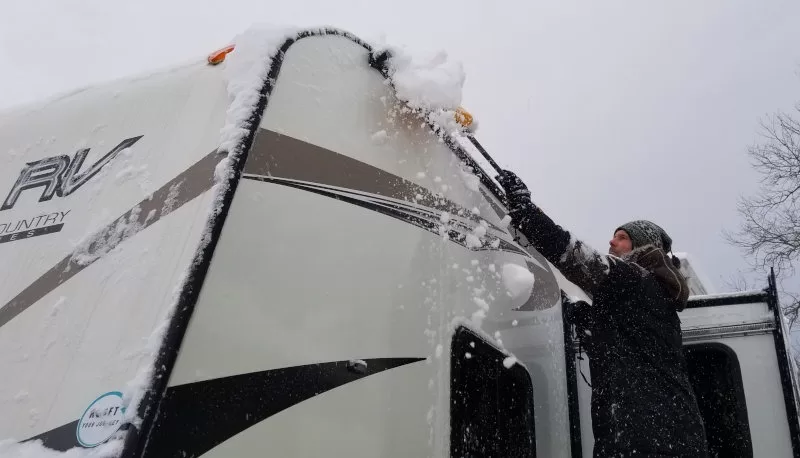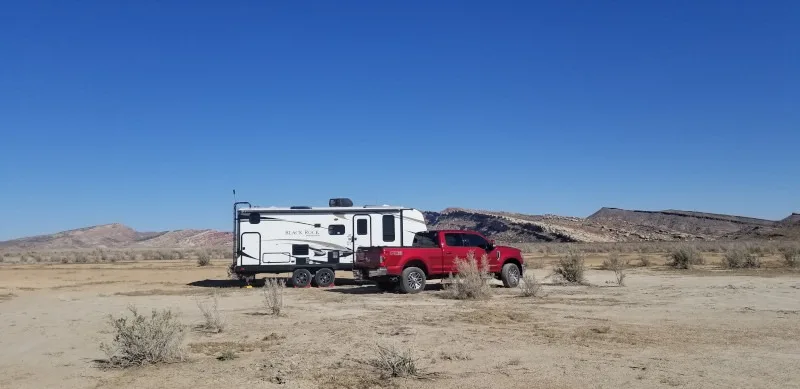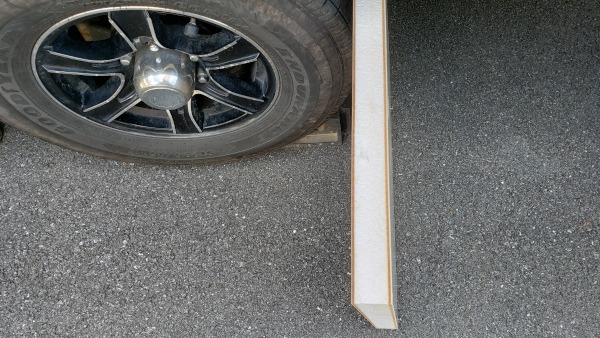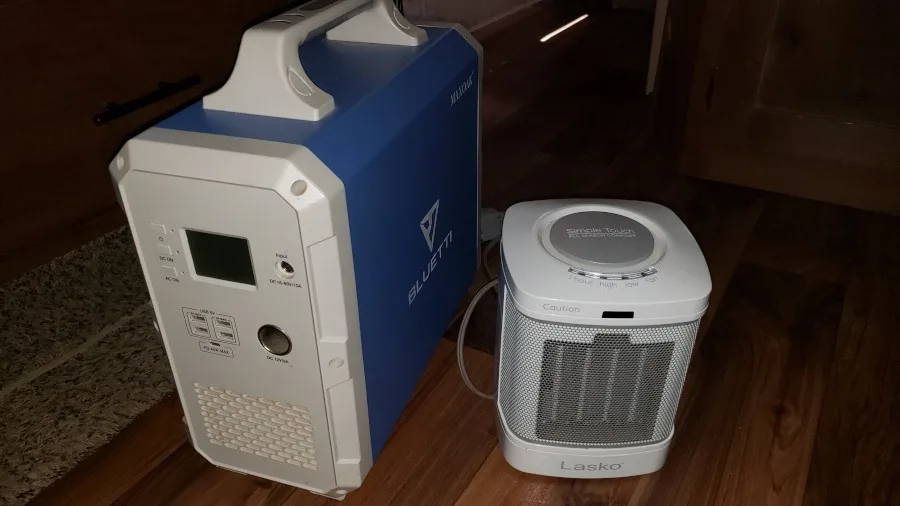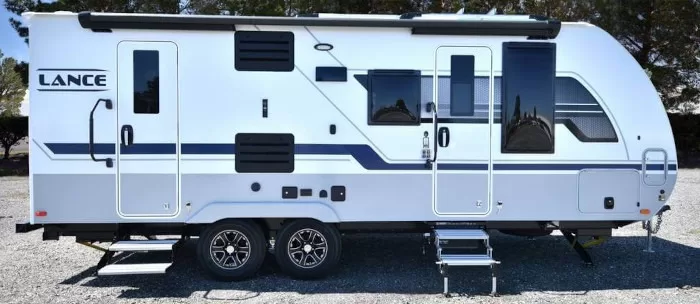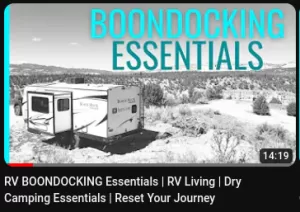Last Updated on 05/10/2024 by Glynn Willard
Why Buy A Well Insulated RV?
The two most important reasons for seeking a travel trailer (or any RV) with the best insulation are:
- Maintain the comfort of the RV’s interior.
- Minimize the use of your air conditioner in the summer or minimize heat loss in the winter.
No doubt, you want to be comfortable. But I bet most of you want to save money too!
Let’s explore the best travel trailers or fifth wheels for hot weather and cold temperatures.
Why did I write this article?
I grew up in the 80’s with a father who specialized in building super-insulated efficient homes.
I learned a few things.
Types Of Extreme Weather Conditions For An RV
It’s one thing to travel with the climate. We’ve all heard of “chasing 70!”
But some of us prefer to move away from the RV crowds, which means our rigs need to have better insulation.
My family learned early on that if you have an all season trailer and stay in “less than perfect” weather, you end up with more boondocking locations from which to choose.
The same applies If you stay in RV parks or campgrounds.
We chose not to stay in the extremes, but rather to push further into the shoulder seasons.
Some individuals enjoy “full-on” winter camping. Camping in the cold of the winter months is not for us.
However, some considerations need to be addressed when shopping for a cold-weather travel trailer.
We’ll address those in a moment.
One important note: the best RV for winter camping is also the best RV for extreme heat.
The only difference is the direction of heat transfer.
As long as the RV comes with the right kind of extra insulation and windows, it will function well in extreme cold and heat.
Heat Transfer As It Relates To An RV
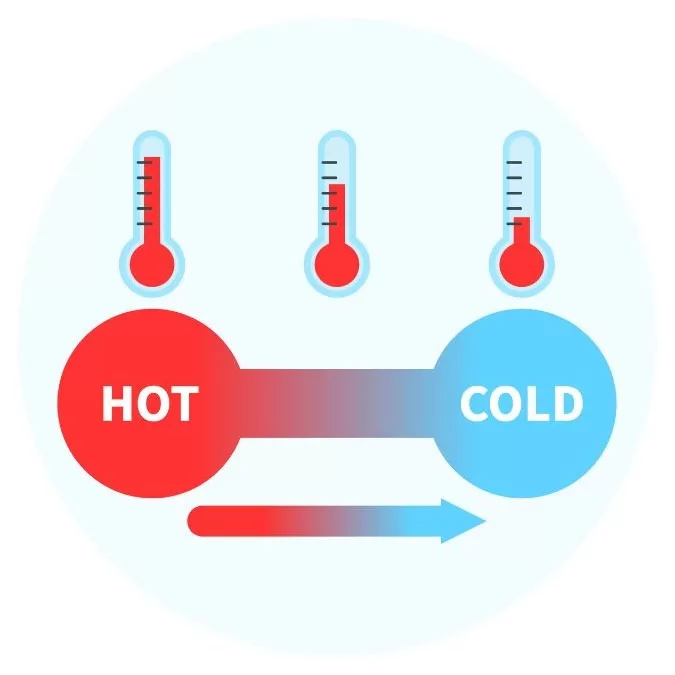
If you recall from chemistry or physics class, heat flows toward cold.
So in the winter, warm air is trying to get out of your RV.
And during the summer, the warm air is trying to get into your RV.
Technically, it’s always trying to reach thermal equilibrium between the boundary of the inside and the great outdoors.
This boundary includes your exterior walls, windows, roof, and underbelly.
Each one of those boundaries varies in its building materials and insulation.
In most RV’s the weakest points are the windows and window frames. Especially if the trailer only came equipped with single-pane windows.
One also has to consider the thermal conductivity of the materials used in your RV’s build.
In other words, how much heat transfer occurs through the aluminum studs in the wall or ceiling?
If you place a thermal imaging camera in front of an RV, you’ll see the skeletal outline of the studs and rafters.
Aluminum studs have a relatively high thermal conductivity and are technically referred to as a thermal bridge.
In other words, you will experience heat moving toward cold through the aluminum wall studs.
I’m not sure if any RV manufacturer utilizes a thermal break, which blocks the aluminum from the interior and exterior layering.
It’s worth exploring.
Important Aspects Of An RV For Weather Extremes
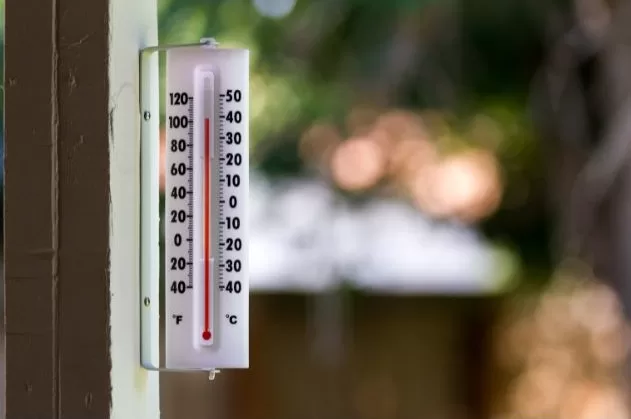
In this section, we’ll discuss what aspects you should look for when shopping for a four-season camper trailer.
- Smaller floor plan, i.e., the less living area to heat or cool, the easier it is to on the HVAC systems.
- Insulated and heated underbelly to prevent your water lines, fresh water tanks, and holding tanks from freezing. Most of the manufacturers featuring an extreme weather package come with an enclosed underbelly.
- A heavily insulated roof since a lot of heat is lost through the roof in the winter. Look for the highest R factor in the roof that you can find if winter camping is your intention.
- Dual pane windows that are tinted to keep sunlight to a minimum.
- A robust heating system (propane furnace) and air conditioning system. Especially for larger floor plans of a fifth wheel.
- Ability to apply RV skirts during the winter. This helps prevent the winds from harsh weather from freezing your underbelly.
- Holding tank heaters also helps to prevent your water systems from freezing. They’re usually standard with a cold weather package.
- Solar panels to keep your battery bank topped off since you’ll be relying a lot on your electrical systems to heat or cool your rig.
Just because a trailer has a heated underbelly, doesn’t mean it’s adequately insulated.
Many manufacturers will state the RV is “four-season” by adding tank heaters even though it’s poorly insulated.
Your priority is great insulation all around the rig!
Types Of RV Insulation
Not all RV’s insulation is created equally.
- Fiberglass insulation:
As far as I’m concerned, fiberglass insulation has no place in any kind of RV. It settles, is useless when wet, and is prone to mold.Let’s not forget, that an RV moves a lot amplifying the settling of fiberglass insulation.
- Closed cell rigid foam
Many of the higher-end trailers, including those listed build closed-cell rigid foam into their walls. It’s your best option for the walls. - Reflective foil
This is typically used in the ceiling in addition to rigid foam or fiberglass to reflect radiant heat. - Spray foam insulation
Spray foam should be professionally installed. But keep in mind, that it’s not the best solution and should only be supplemental to rigid foam insulation.
RV HVAC Systems
Sure, you can purchase the largest air conditioning system possible.
Or the highest BTU furnace, but you’re just going to spend more money and resources if your trailer is poorly insulated.
Let’s look at the options available for heating and cooling your RV.
There’s more than one heat source option for an RV:
- Furnace:
Almost all travel trailers come with a furnace as part of the heating systems. - Electric Space Heater:
An electric heater works great in the small space of an RV. But you’ll need either a generator or to be plugged into shore power. - Electric fireplace:
Some RV’s come with an electric fireplace, which is likely an infrared heater. This type of space heater heats nearby objects rather than the air. - Diesel heater:
I would only consider this as an option if you’re full-time. The installation process is a bit complex if it’s just for one camping trip.
You can learn more about electric space heaters in an RV in our article:
Several options to produce cool air:
-
Standard roof-mounted air conditioner:
Just about every travel trailer amongst the popular choice brands comes with a roof-mounted air conditioner.This may or may not be ducted depending on the size of the living space.
-
Conventional in-window air conditioner:
Yes, there are a few RV manufacturers that use this style, but it’s not common.Taxa Outdoors is one particular brand that utilizes a window unit.
-
Mini split system:
Believe it or not, I’ve seen these as DIY projects and I believe Living Vehicles makes use of this super-efficient system. -
Electric fan:
If it’s not too hot outside an electric fan can be used to keep your RV cool. I suppose that’s stating the obvious!
Not Sure What You Need For Your RV?
RV Manufacturers With True Four-Season Travel Trailers (For Most Budgets)
Some luxury travel trailer manufacturers build true “live aboard” RVs with great insulation.
One such is Living Vehicle, but the price point is too high for the average consumer.
Although they do build an amazing trailer that checks all the boxes!
Outdoors RV
Outdoors RV uses a combination of rigid foam board, fiberglass, and reflective foil.
It’s well insulated and equipped for both hot and cold weather, but it’s heavy.
I would not tow an ORV with anything smaller than a 3/4 ton pickup.
Northwood Arctic Fox
Arctic Fox uses a combination of rigid foam board, fiberglass, and reflective foil.
These campers are also well insulated and equipped for both cold and hot weather, but again, they’re heavy.
The same applies about using a 3/4 ton pickup to tow at a minimum.
Oliver Travel Trailers
Oliver Campers states that their combination of polyethylene bubble, vapor barrier, radiant barrier, and an air gap barrier yields an R-16 value all the way around.
This is not bad, but if you have a family of four or more, Oliver Campers will not accommodate that number of people yet.
We reached out to them and building a bigger unit is on their radar, so stay tuned.
Thermal pane windows (double pane windows) are incorporated into the construction for a high R-value (for a window).
Overall, I believe this is the best travel trailer for both hot and cold environments.
But again, it’s only suitable to sleep three or fewer for now.
Lance
Lance Campers uses a combination of high-density rigid foam board, multiple layers of Azdel and a synthetic membrane roof with a moderately high R-value.
They offer lightweight units that sleep four, which is a bonus.
My Pick For The Best Recreational Vehicle For Cold Climates
For winter weather, I’d go with Arctic Fox if there are more than three of you and Oliver Travel Trailers if there are three or fewer of you.
Oliver Travel Trailers has a better-than-average build quality that focuses on efficient climate control.
If they produced a unit that slept four, they would be my first choice for winter camping.
My Pick For The Best Travel Trailers With A High R-Value For Hot Outdoor Air
This is a toss-up between Outdoors RV and Oliver Travel Trailers. The deciding factor comes down to the number of family members who will be staying in the trailer.
If you have four or more, Outdoors RV is very well insulated and built like a tank! But it’s heavy.
If there are only two of you, Oliver Campers is a great option for camping in high temperatures.
Our Experience With Our Outdoors RV
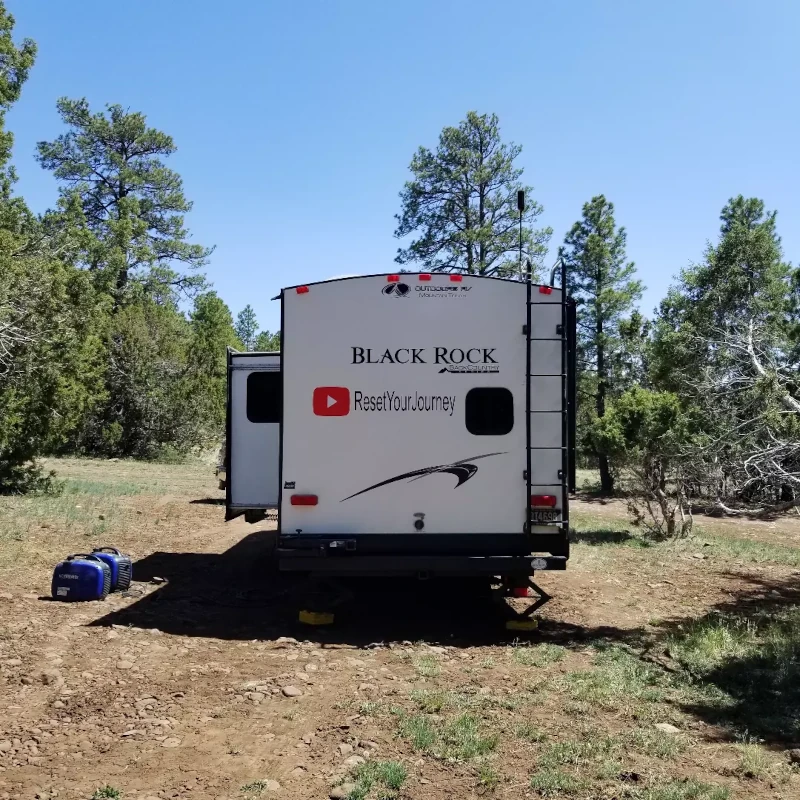
The two leakiest points were the window frames and the tiny gap between the slide and exterior walls.
Otherwise, we were very impressed with how cool it stayed in the heat and how warm it stayed in the winter months.
I wasn’t too happy with the loose fiberglass insulation in the floor.
Our P-trap loosened in the shower and leaked into the underbelly. It didn’t take long to realize that the fiberglass creates a real mold potential.
Regardless, we didn’t have any big problems with our ORV. Perhaps we just got lucky.
But over 35k miles in a short period puts any travel trailer through its paces.
It stood up to the challenge and asked for more!
Wrapping Up The Best RV For Extreme Temperatures
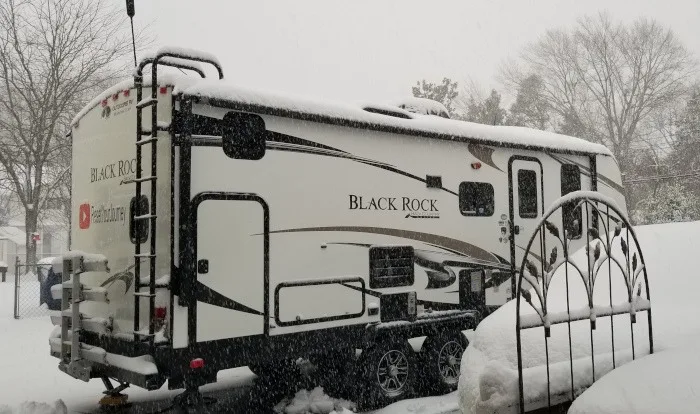
Whether your goal is to keep the cold air in or out of your RV, the most important aspects are:
- A lot of quality insulation all the way around the RV. Specifically high-density rigid foam and a reflective material.
- Dual-pane windows to accommodate for the “weakest link” in the chain.
Oliver Travel Trailers is a newer company with a completely different take on RV construction.
And I’m impressed! We reached out to them to inquire about plans for a larger unit to accommodate more sleepers.
It’s on their radar and in talks to build a bigger trailer. Keep an eye on this company.
They’re doing it right!
If you have a family of four or more and prefer to boondock in all seasons, Outdoors RV is your best choice.
One last point to mention.
Arctic Fox and ORV trailers are heavy. Make sure you have the appropriate tow vehicle.
Lance and Oliver trailers weigh less but still make sure you pay close attention to the tongue weight of a loaded trailer.
Which travel trailer has served you well in extreme weather?
Meet the author.
We appreciate any help in bringing you great content. Donate or buy us a coffee on our Ko-Fi site. Or subscribe to our YouTube Channel.
Thank you so much for being here!


